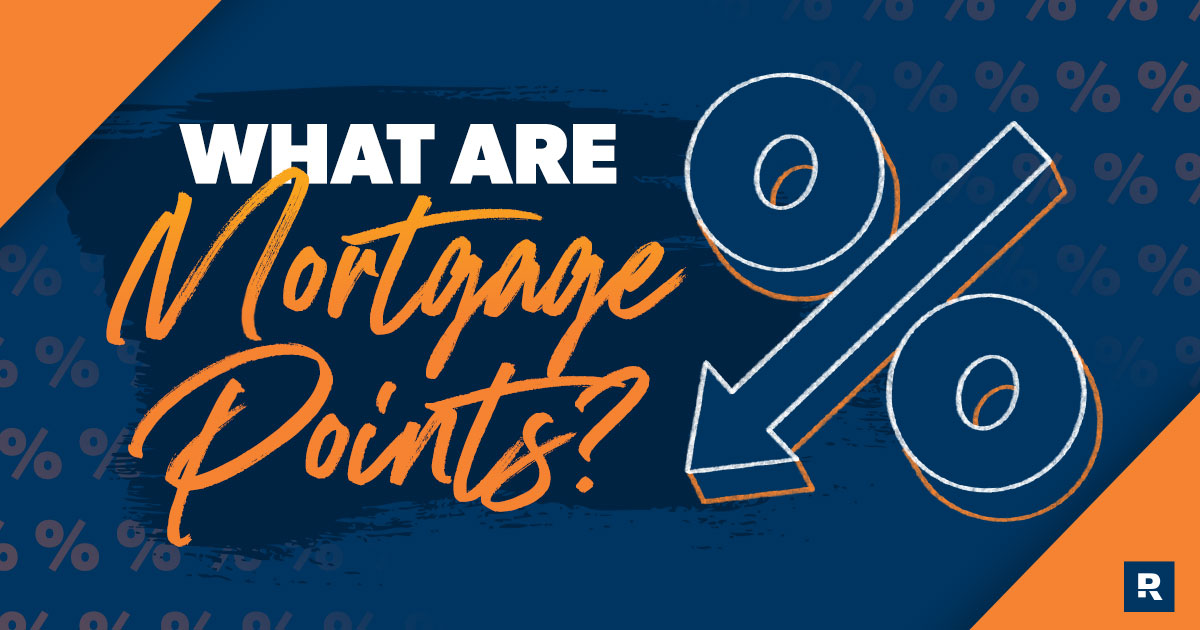What Are Mortgage Points and How Do They Work?
8 Min Read | Dec 11, 2024

Mortgage points are kind of like free throws in a basketball game. And points are how you win the game, so you want as many as you can get, right? Turns out, these points come at a cost. And it’s not always worth it.
Mortgage points can be super confusing, which makes it really hard to know whether or not they’re a smart choice for you. Are they really a money-saving deal?
Since buying a home is one of the most expensive purchases you might ever make, we’ve found out everything you ever wanted to know about mortgage points. (Lucky for you, we’ve narrowed it down to what’s actually important.)
Types of Mortgage Points
So what types of points are we playing for here? Just like with basketball (stick with us here), there are different types of mortgage points: origination points and discount points.
Let’s get origination points out of the way (because, honestly, that’s not really what this article is about). This type of mortgage point is basically a fee that doesn’t lower your interest rate. It just pays your loan originator. Trust us, you’re better off paying out-of-pocket for their service. Skip origination points.
Next up (and for the rest of this article), let’s talk discount points. Lenders offer mortgage discount points as a way to lower your interest rate when you take out a mortgage loan. The price you pay for points directly impacts the total interest of the loan. And the more points you pay, the lower the interest rate goes.
That might sound all sunshine and roses at first, but get this—it’s going down because you’re prepaying the interest. In reality, you’re just paying part of it at the beginning instead of paying it over the life of the loan.
How Do Mortgage Points Work?
After you apply for a mortgage, your lender will offer discount points as a way to lower your overall interest rate. Your point options will be on official home transaction documents like the Loan Estimate and Closing Disclosure. Most lenders allow you to purchase between one to three discount points.
To buy mortgage points, you pay your lender a one-time fee as part of your closing costs.
Get the right mortgage from a trusted lender.
Whether you’re buying or refinancing, you can trust Churchill Mortgage to help you choose the best mortgage with a locked-in rate.
How Much Does One Point Lower Your Interest Rate?
One discount point usually equals 1% of your total loan amount and lowers the interest rate of your mortgage around one-eighth to one-quarter of a percent. But heads up: the actual percentage change will depend on your mortgage lender.
Is your head spinning yet? Well hang on, we’re about to do some math.
To help this all make sense, let’s break it down. Suppose you’re buying a $300,000 house. You have a 20% down payment and are taking out a 30-year fixed-rate conventional loan of $240,000 at a 4.5% interest rate.
To lower the interest rate, you pay your lender for one mortgage point at closing, and assuming that point equals 1% of your loan amount, it will cost $2,400.
$240,000 loan amount x 1% = $2,400 mortgage point payment
Dave Ramsey recommends one mortgage company. This one!
After you buy the mortgage point, your lender reduces the interest rate of your mortgage by, say, a quarter of a percent. That takes your interest rate from 4.5% to 4.25%.
This slightly lowers your monthly payment from $1,562 to $1,526—which is $36 less a month on a fixed-rate conventional mortgage.
You can use our mortgage calculator to figure the difference between the interest amount with the original rate (4.5%) and the interest amount with the reduced rate (4.25%) over the full lifespan of the loan.
Are you still with us? Okay, good.
Without any mortgage points, you’ll pay a total of $197,778 in interest. With one mortgage point, you’ll drop that amount to $185,035—which saves you $12,743 in total interest.
$197,778 original total interest paid – $185,035 reduced total interest paid = $12,743 amount saved
But when you account for the $2,400 you paid for the mortgage point, you really only saved $10,343.
$12,743 interest savings – $2,400 mortgage point = $10,343 true savings
Okay, we know we just threw a lot of numbers at you hard and fast. Just know this process is known as “buying down the rate.” But remember, you’re really just prepaying interest here. The more points you buy, the more interest you prepay—which is why your lender would be willing to lower the interest rate on your loan (they’re not Santa Claus after all).
Take a look at the chart below to see how this example plays out with two mortgage points.
| 30-year loan amount: $240,000 | No Points | 1 Mortgage Point | 2 Mortgage Points |
| Cost of Point(s) | N/A | $2,400 | $4,800 |
| Interest Rate | 4.5% | 4.25% | 4% |
| Monthly Payment | $1,562 | $1,526 | $1,491 |
| Monthly Savings | N/A | $36 | $71 |
| Total Interest Paid | $197,778 | $185,984 | $172,486 |
Should You Pay for Mortgage Points?
It seems odd to say, but buying mortgage points to lower your interest rate could actually be a complete rip off. In fact, most other types of mortgage buydowns (like a 3-2-1 buydown) aren't a very good deal either. Say what? How can a lower interest rate be a bad deal?
For starters, it could be years before you really save any money on interest because of your mortgage points. To see what this would look like, you’d first need to calculate what’s known as your break-even point.
What Is the Break-Even Point on a Mortgage?
The break-even point is when the interest you saved is equal to the amount you paid for mortgage points. They sort of cancel each other out.
Alright, it’s time to go back to math class again. Let’s calculate the break-even point from our example we used before. To do this, just divide the cost of the mortgage point ($2,400) by the amount you’d be saving per month ($36). And there you have it, that answer is the break-even point.
$2,400 / $36 = 67 months (5 years and 7 months)
In other words, in 67 months, you’d have saved over $2,400 in interest—the same amount you paid for the mortgage point. After reaching the break-even point, you’ll pocket that $36 each month, which will be the money you save on interest because of the mortgage point you bought.
Want More Expert Real Estate Advice?
Sign up for our newsletter! It’s packed with practical tips to help you tackle the housing market and buy or sell your home with confidence—delivered straight to your inbox twice a month!
Are Mortgage Points Worth It?
Here’s the thing: Mortgage points could be worth it if you actually reach your break-even point—but that doesn’t always happen.
According to the National Association of Realtors’ 2018 report, the median number of years a seller remained in their home was 10, the same as last year. From 1985 to 2008, NAR reports the tenure in a home was six years or less.(1)
While 10 years is enough time to break-even in our example, most buyers won’t regain their money on mortgage points because they usually refinance, pay off, or sell their homes before they reach their break-even point.
While 10 years is enough time to break-even in our example, most buyers won’t regain their money on mortgage points because they usually refinance, pay off, or sell their homes before they reach their break-even point.
So what’s an eager homebuyer to do? Instead of buying mortgage points, put that extra money toward your down payment and reduce your loan amount altogether! Ding, ding!
An even better way to lower your interest rate without taking the risk of mortgage points at all is to shorten the length of your loan from a 30-year fixed-rate conventional loan to a 15-year one, which is the type we recommend.
If your estimated interest rate still looks way too high, get a real estate agent who can help you find a house that’s actually within your budget.
Beware of Adjustable-Rate Mortgage Points
If you’re thinking about getting an adjustable rate mortgage (ARM) loan, don’t do it! ARM loans are one of the top mortgages to avoid because they allow lenders to adjust the rate at any time. This just transfers the risk of rising interest rates (and monthly payments) to you—yeah, count us out. Seriously, these things are terrible.
Oh, and that’s not all. If you buy mortgage points on an ARM loan, lenders might only provide a discount on the interest rate during the initial fixed-rate period.
Once the fixed-rate period is over, you lose your discount, which could happen before you even reach the break-even period. How convenient! That’s a win for the bank—not for you.
Do Mortgage Points Affect Taxes?
Mortgage points may be tax deductible as home mortgage interest—but that still doesn’t make them worth buying. In order to qualify, the loan must meet a slew of qualifications on a lengthy list of bullet points, all of which are determined by the IRS.(2)
If you’ve already bought mortgage points, check with a tax advisor to make sure you qualify to receive those tax benefits.
Get a Smart Mortgage
Let’s be real: Your house may be the biggest purchase you’ll ever make. Take the time to get this right! To find a good lender who can help you feel confident about your mortgage, contact our friends at Churchill Mortgage. They’ve helped thousands of people like you understand and finance their home the smart way.
Did you find this article helpful? Share it!

We Hear You!
We’re considering adding the ability to save articles to your Ramsey account.




